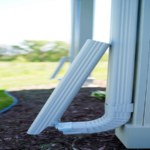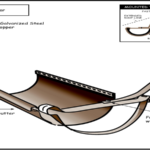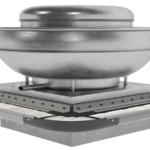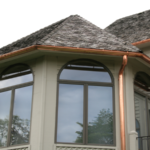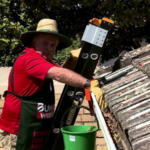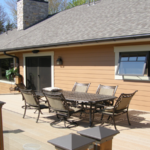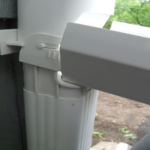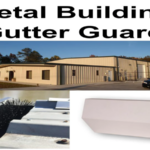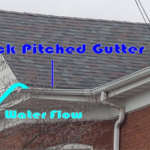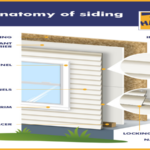If you’re considering a home gutter installation, you might be wondering if it’s worth the effort and expense. After all, gutters are one of those things that you don’t really think about until they’re not working properly. But trust us, gutters are important! They play a crucial role in protecting your home from water damage, and when they’re not functioning properly, they can cause all sorts of problems.
Gutters are tricky to install.
If you’ve never installed gutters before, you might not realize how tricky they can be. There’s a lot of measuring and cutting involved, and if you don’t do it right, the gutters won’t fit properly. And even if they do fit, they might not function properly if they’re not installed correctly.
Gutters need to be installed properly to work properly.
Gutters are designed to channel water away from your home, but they can only do that if they’re installed properly. If they’re not, water can seep behind the gutters and cause all sorts of problems, from water damage to mold and mildew.
Gutters are heavy, and they need to be installed correctly to support the weight.
Why would you not put gutters on a house?
There are actually a few reasons why you might not want to put gutters on your house. For one, they can be a bit of an eyesore, especially if they’re not well-maintained. They can also be a pain to clean, and if they’re not installed properly, they can actually do more harm than good by causing water to pool around your foundation.
What are some common mistakes that people make when installing gutters?
- Not using a level: This is probably the most common mistake people make when installing gutters. If your gutters are not level, they will not drain properly and could cause water damage to your home.
- Not securing the gutters: Another common mistake is not securing the gutters properly. If the gutters are not properly secured, they could come loose and fall, causing damage to your home.
- Not cleaning the gutters: This is a mistake that can lead to gutters becoming clogged and not draining properly. Be sure to clean your gutters regularly to avoid this problem.
- Not installing gutter guards: Gutter guards can help to prevent leaves and other debris from clogging your gutters. This is a good investment to make to avoid future problems.
- Installing the wrong size gutters: Be sure to measure your home before purchasing gutters to ensure you get the right size. Installing gutters that are too small or too large can cause problems with drainage.
What is the most common problem with gutters?
The most common problem with gutters is that they become clogged with leaves and other debris. This can cause water to back up and overflow, which can damage your home’s foundation or cause flooding in your basement.
Is a house better with or without gutters?
There are pros and cons to having gutters on a house. One pro is that gutters can help protect a house from water damage. They do this by directing rainwater away from the house and into a drainage system. This can prevent the rainwater from seeping into the house and causing problems like mold growth or water damage to the structure. Another pro is that gutters can help prevent erosion around the foundation of a house. When rainwater falls directly on the ground around a house, it can cause the soil to erode. This can make the foundation of the house unstable and can lead to serious problems. Gutters can help to prevent this by directing the rainwater away from the house.
There are also some cons to having gutters. One is that they can be a maintenance issue. Gutters need to be cleaned out regularly to prevent them from getting clogged. If they do get clogged, it can cause water to back up and overflow, which can lead to damage to the house. Another con is that gutters can be a source of leaks. If they are not installed properly, they can develop leaks. These leaks can allow water to enter the house, which can cause water damage.
Are gutters unnecessary?
There are a few reasons why gutters might be considered necessary. First, gutters can help to protect your home from water damage. If your home doesn’t have gutters, rainwater can fall directly onto your home’s foundation, which can lead to cracks and leaks. Gutters can also help to protect your home’s siding and windows from water damage.
Another reason why gutters might be considered necessary is that they can help to prevent flooding in your basement. If your home doesn’t have gutters, rainwater can pool around your foundation and seep into your basement, causing flooding.
Finally, gutters can help to keep your landscaping in good condition. If rainwater falls directly onto your landscaping, it can wash away soil and damage plants. Gutters can help to direct rainwater away from your landscaping, protecting it from damage.
Why don’t Florida homes have gutters?
There are a few reasons for this. One reason is that Florida homes are built to withstand heavy rains and hurricanes, so they don’t need gutters to protect them from water damage. Another reason is that gutters can actually be more of a liability than a asset in Florida. This is because they can collect leaves and debris, which can then clog and cause water to back up and damage your home.
What is a drip path instead of gutters?
A drip path is a channel or trench that is installed along the edge of a roof. It is designed to collect and channel water that drips or leaks from the roof, and to direct it away from the building. A drip path is an alternative to gutters, and is often used on roofs that are too steep or slippery for gutters to be installed.
How do I keep water out of my foundation without gutters?
One way to keep water out of your foundation without gutters is to install a French drain. A French drain is a drainage system that consists of a gravel-filled trench with a perforated pipe running through it. Water from your roof runs into the trench and is then redirected away from your foundation.
Another way to keep water out of your foundation is to grade your landscaping so that it slopes away from your house. You can also install a drain at the base of your foundation to catch any water that does seep in and redirect it away from your home.
Conclusion
If you’re thinking about installing gutters on your home, you might want to think twice. While it may seem like a simple enough project, there are a lot of things that can go wrong. From choosing the wrong materials to not properly securing the gutters, it’s best to leave this job to the professionals. Not only will they get the job done right, but they’ll also be able to do it in a fraction of the time it would take you to do it yourself.

